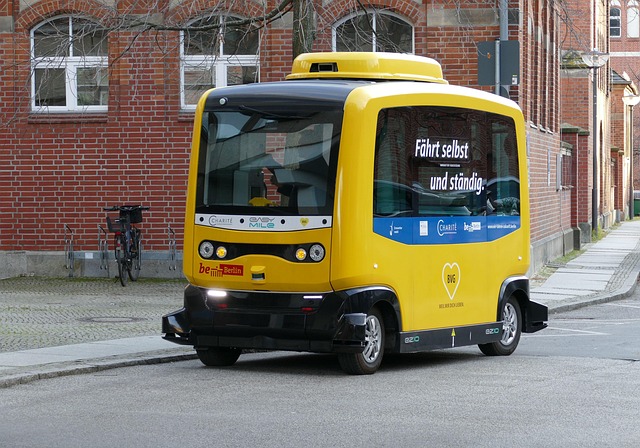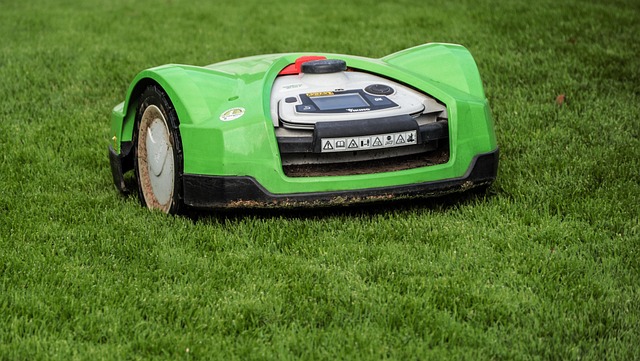Robotic Personal Assistants (RPAs), powered by AI, are transforming daily life with services from task management to companionship. The integration of Autonomous Vehicles (AVs) and advanced pedestrian detection technology allows RPAs to navigate complex environments safely. Select Autonomous Vehicles offer hands-free transportation and enhanced safety, boosting accessibility and efficiency. While ethical considerations like user privacy and liability must be addressed, the future holds promise for sophisticated RPA conversations and integrated AV experiences, revolutionizing daily routines with innovation and sustainability in mind.
Robotic Personal Assistants (RPAs) are transforming daily life, offering unprecedented convenience and efficiency. This article explores the dynamic interplay between RPAs and select autonomous vehicles, delving into their roles, benefits, challenges, and future prospects. From household tasks to complex logistics, RPAs powered by advanced AI and autonomous driving technologies are revolutionizing industries. Understanding these innovations is crucial for navigating the evolving landscape of personal assistance.
- Understanding Robotic Personal Assistants: A Modern Innovation
- The Role of Autonomous Vehicles in Shaping RPAs
- Benefits and Applications: Revolutionizing Daily Life
- Challenges and Ethical Considerations in RPA Development
- Future Prospects: Where Are Robotic Personal Assistants Headed?
Understanding Robotic Personal Assistants: A Modern Innovation

Robotic personal assistants, a modern innovation in the field of artificial intelligence (AI), represent a significant step forward in automation and human-machine interaction. These advanced robots are designed to understand and respond to human commands, offering a wide range of services from task management to companionship. With capabilities that extend beyond simple voice recognition, these assistants can navigate complex environments using select autonomous vehicles, ensuring safety and efficiency.
The rise of robotic personal assistants is not without its considerations, particularly in the realms of autonomous vehicle regulations and nighttime visibility in driverless cars. As these technologies continue to evolve, addressing driverless car ethics becomes increasingly important. Despite these challenges, the potential for improving quality of life, enhancing accessibility, and revolutionizing various industries through autonomous vehicle startups is profound.
The Role of Autonomous Vehicles in Shaping RPAs

The integration of autonomous vehicles (AVs) has significantly influenced the development and potential of Robotic Personal Assistants (RPAs). As AVs navigate our roads, they contribute to a safer and more efficient transportation ecosystem, which in turn creates opportunities for RPAs to excel. One key aspect is improved pedestrian detection for cars, ensuring both humans and robots can coexist harmoniously. This advanced technology allows RPAs to operate with greater independence, as they can anticipate and avoid potential obstacles on their paths.
Moreover, the automotive industry’s focus on AI integration in vehicle safety has led to breakthroughs that benefit RPA applications. These innovations not only enhance overall vehicle safety but also enable RPAs to navigate complex environments more effectively. Additionally, the emergence of autonomous vehicle insurance underscores the evolving role of self-driving cars and their impact on personal assistant robots, as it addresses the unique challenges and risks associated with this emerging technology.
Benefits and Applications: Revolutionizing Daily Life

Robotic personal assistants, featuring advanced artificial intelligence and machine learning capabilities, are poised to revolutionize daily life by providing assistance in numerous aspects. One of their key benefits is enhanced efficiency; these robots can automate mundane tasks, from scheduling appointments to managing household chores, thus saving consumers valuable time. This frees up individuals to focus on more meaningful pursuits, promoting improved work-life balance.
Moreover, the integration of robotic assistants into daily routines offers unprecedented accessibility and convenience. Select Autonomous Vehicles, designed with sustainable practices in mind, can navigate environments autonomously, improving mobility for individuals with disabilities or those who prefer hands-free transportation. Features like pedestrian detection ensure safe interactions between vehicles and pedestrians, enhancing overall safety on roads. Such robots contribute to a future where technology not only simplifies life but also promotes inclusivity and sustainability through innovative solutions.
Challenges and Ethical Considerations in RPA Development

The development of Robotic Personal Assistants (RPA) presents a multitude of challenges and ethical considerations. As RPA technologies advance, integrating them into daily life raises concerns about privacy, data security, and user autonomy. Ensuring that these assistants respect user privacy, safeguard sensitive information, and operate transparently is paramount. For instance, autonomous vehicles, a prominent application of RPA, face significant liability issues as their decision-making processes in complex situations become more scrutinized.
Moreover, the ethical implications extend to safety concerns, particularly with self-parking cars for sale and electric autonomous vehicles. Navigating these challenges requires robust regulatory frameworks that address liability issues while fostering innovation. Developers must also prioritize safe autonomous vehicles, leveraging advanced sensors and intelligent algorithms to minimize risks on the road. In terms of environmental impact, promoting electric autonomous vehicles could contribute to sustainability goals by reducing carbon emissions, albeit in light of the current limitations and infrastructure needs.
Future Prospects: Where Are Robotic Personal Assistants Headed?

The future of robotic personal assistants is promising and filled with potential innovations. As technology advances, we can expect to see these assistants become more integrated into our daily lives, offering unparalleled convenience and efficiency. With advancements in artificial intelligence, robots will likely develop sophisticated conversational abilities, enabling them to understand complex queries and provide tailored responses. Imagine a world where your personal assistant can not only schedule appointments and manage reminders but also engage in meaningful conversations, offer expert advice, and assist with various tasks, from cooking to home maintenance.
One exciting area of development is the integration of robotic assistants into autonomous vehicles. Select Autonomous Vehicles (SAVs) have already started to transform transportation, and their impact on personal assistance could be profound. Driverless car ethics and user experience in self-driving cars will play a crucial role in shaping this evolution. The concept of an assistant that can navigate public transport autonomously or even facilitate share mobility models is not just science fiction; it’s a reality in the making. As these vehicles become more common, we might see robotic assistants becoming integral to our commuting experience, providing a safe, efficient, and personalized journey while ensuring a seamless transition between home, work, and leisure activities through autonomous public transport.
Robotic personal assistants (RPAs) are poised to revolutionize daily life, offering unprecedented convenience and efficiency. As autonomous vehicles continue to shape this landscape, the future looks bright for RPAs, with enhanced capabilities and broader applications. However, navigating challenges in development and addressing ethical considerations are crucial steps to ensure these innovations benefit society as a whole. By leveraging advancements in technology, we can create a world where RPAs become indispensable companions, making our lives easier and more connected.
